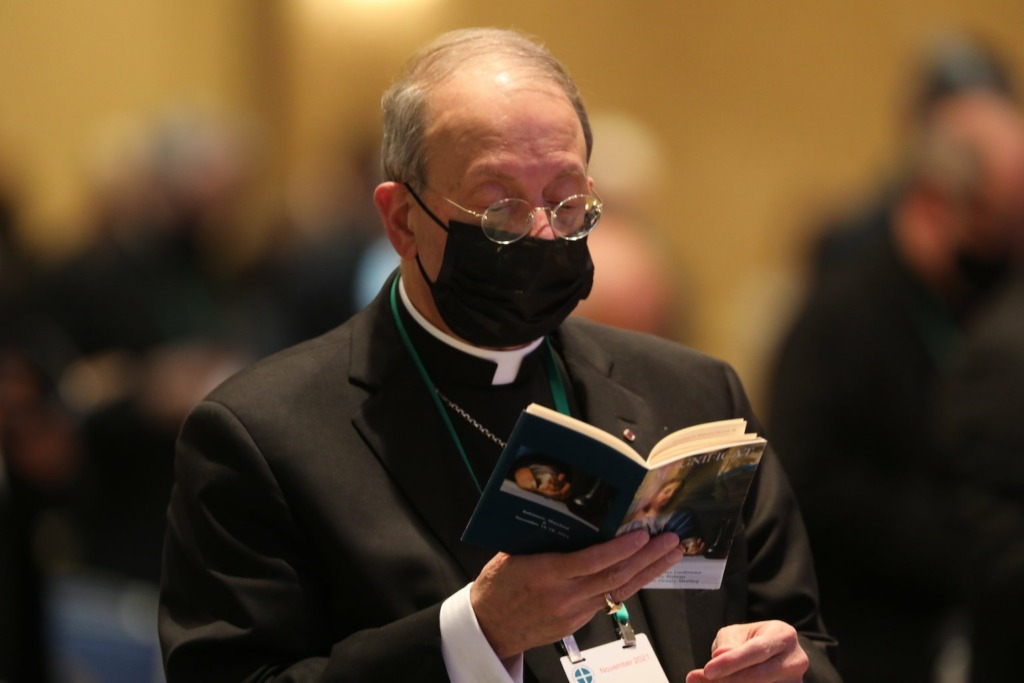BALTIMORE — The U.S. bishops spotlighted two major initiatives focused on the central role of the Eucharist Nov. 17, the second of two days of public sessions of their fall general assembly.
The U.S. Conference of Catholic Bishops approved a 26-page statement, “The Mystery of the Eucharist in the Life of the Church,” with 222 “yes” votes, and also OK’d plans for a three-year National Eucharistic Revival that will culminate with the National Eucharistic Congress 2024 in Indianapolis.
On other matters, they were invited to take a multicultural journey with young Catholics to Chicago next June; were urged to implement a framework for marriage and family ministry that they had approved at their spring assembly in June; agreed to begin review of the “Charter for the Protection of Children and Young People” earlier than planned; and heard how the pandemic may have slowed but not stopped a pro-life initiative called “Walking With Moms in Need.”
They approved guidelines governing the USCCB’s financial investments that include wider limits on where money would be invested. The guidelines advance a policy of engagement on corporate practices that impact human dignity.
The prelates, meeting in person for a national gathering for the first time since 2019, also approved guidelines for the exposition of the Eucharist and Benediction, affirmed sainthood causes for three U.S. laypeople, approve revisions of statutes for the catechumenate and voted for revised English- and Spanish-language editions of the Order of Christian Initiation of Adults.
The bishops assigned a feast date to St. Teresa of Kolkata — Sept. 5, the death date in 1997 for the founder of the Missionaries of Charity. It will be an optional memorial on the U.S. liturgical calendar.
Their vote on the Eucharist statement came a day after their discussion of the document — a discussion that was markedly different than their debate in June about what it could potentially contain, namely a call for President Joe Biden and Catholic politicians who support abortion to be denied Communion. But the final document had nothing like that and is addressed to all Catholics in the United States.
It “endeavors to explain the centrality of the Eucharist in the life of the Church,” said Bishop Kevin C. Rhoades of Fort Wayne-South Bend, Indiana, chairman of the bishops’ doctrine committee, in a short presentation on the statement Nov. 16. It “addresses the fundamental doctrine about the Eucharist that the Church needs to retrieve and revive.”
Even bigger than the statement is the plan for the three-year eucharistic revival, ending with the National Eucharistic Congress 2024 in Indianapolis. The bishops approved it 201-17, with five abstentions.
The revival will officially start on the feast of Corpus Christi, June 16, 2022, with a diocesan focus that will include eucharistic processions and other events of adoration and prayer around the country. In 2023, the emphasis will be on parishes and resources aimed at increasing Catholics’ understanding of what the Eucharist really means.
As chairman of the bishops’ Committee on Evangelization and Catechesis, Auxiliary Bishop Andrew H. Cozzens of St. Paul and Minneapolis, who was recently named bishop of Crookston, Minnesota, gave the bishops details about this planned revival just before they voted on it.
The revival could be a time of healing for the entire Church, he said, as well as a movement of evangelization and a reawakening of understanding of the sacrament of the Eucharist for Catholics across the country.

